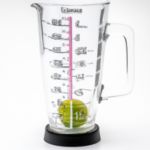Juice Tips and Tricks
How Much Lime Juice In A Lime

You may be asking yourself – is there truly that much juice in just one lime? This is a valid question, especially when you’re cooking a meal or making a drink that calls for lime juice and you’re trying to determine how many limes to buy.
The truth is, the amount of juice in a lime can vary based on several factors, but there is an average amount you can expect to get. Factors such as the size and ripeness of the lime, as well as how you extract the juice, can all affect how much juice you get from a single lime.
In this article, we’ll dive into these factors and give you an idea of what to expect when squeezing limes for your next recipe or drink. We’ll also explore the health benefits of lime juice, alternatives to fresh lime juice, and common mistakes to avoid when using this citrusy ingredient.
So, let’s get started and find out just how much juice is hiding inside that little green gem.
Key Takeaways
- The amount of juice in a lime is affected by its size, ripeness, and extraction method.
- Fully mature but not overripe limes are optimal for harvesting.
- Persian limes produce more juice than other varieties, and ripe and larger limes generally have more juice.
- Lime juice is a versatile ingredient that adds flavor to recipes, has health benefits, and should be stored properly to prevent spoilage.
Factors Affecting the Amount of Juice in a Lime
You might be surprised to learn that the amount of juice in a lime can vary depending on factors like its ripeness and size! Factors affecting lime juice yield include the amount of rainfall the tree received, the temperature during the growing season, and the amount of sunlight it received.
The optimal harvesting time for limes is when they are fully mature, but not overripe. Overripe limes will have less juice and may even be dry inside. On the other hand, underripe limes may not have fully developed their juice sacs yet. This means they will have less juice and it may be less sweet.
When it comes to size, larger limes will generally have more juice than smaller ones. However, this also depends on the variety of lime. For example, key limes are smaller than Persian limes, but they are known for having a stronger flavor and more juice per ounce.
It’s important to note that while the amount of juice in a lime can vary, there is an average amount that can be expected. On average, a single lime yields around 2 tablespoons of juice. Therefore, if you’re wondering “how many limes for a cup,” it typically takes about 6 to 8 limes to produce a full cup of juice. Of course, the exact number may depend on the size and freshness of the limes.
The Average Amount of Juice in a Lime
Did you know that the average lime contains about 0.5 fluid ounces of liquid? This amount of juice is affected by several factors, including the variety of lime and the method of juice extraction used.
Some lime varieties, such as the Persian lime, are known to produce more juice than others. Additionally, the ripeness of the fruit also affects the amount of juice it contains. Ripe limes tend to have more juice than unripe ones.
When it comes to juice extraction, the method used can also impact the amount of juice obtained. Squeezing a lime by hand may not yield as much juice as using a mechanical juicer. However, using a mechanical juicer can also extract some of the bitter oils from the lime peel, which can affect the flavor of the juice.
Knowing the average amount of juice in a lime can be helpful when planning recipes that call for lime juice. Speaking of which, let’s move on to the next section about using lime juice in recipes.
Using Lime Juice in Recipes
Using lime juice in recipes adds a refreshing and tangy flavor that complements a variety of dishes. Here are three tips for juicing limes efficiently:
- Roll the lime on a hard surface before cutting it open to help release the juices.
- Use a citrus juicer or a fork to extract as much juice as possible from the lime.
- To prevent the juice from becoming bitter, avoid squeezing the lime too hard and try to avoid getting any of the bitter white pith in the juice.
Aside from being a great addition to recipes, lime juice also has benefits for the skin. Its high vitamin C content makes it a popular ingredient in skincare products for its ability to brighten and even out skin tone. With all these benefits, it’s no wonder lime juice is such a versatile ingredient in both the kitchen and the bathroom.
Moving on to the health benefits of lime juice, it’s important to note that lime juice is a great source of antioxidants, which can help protect against chronic diseases.
The Health Benefits of Lime Juice
The health benefits of lime juice can’t be overlooked. It’s a great source of antioxidants. Lime juice is extracted from the fruit by squeezing it, and it’s used in many recipes to add flavor and acidity.
It’s also used in lime water therapy, which involves drinking a glass of lukewarm water with lime juice in the morning. This can help improve digestion and boost the immune system.
Lime juice contains high levels of vitamin C, which is essential for maintaining healthy skin, hair, and bones. It also contains flavonoids and other antioxidants that help reduce inflammation and prevent chronic diseases.
However, it’s important to note that excessive consumption of lime juice can lead to tooth erosion and other health problems. Therefore, it’s recommended to use lime juice in moderation and consult a healthcare professional before starting any new dietary regimen.
As an alternative to fresh lime juice, there are many bottled lime juices available in the market that can be used in recipes. These juices are made from concentrate and may not have the same health benefits as fresh lime juice. However, they can be a convenient option for those who don’t have access to fresh limes or don’t want to go through the hassle of juice extraction.
Alternatives to Fresh Lime Juice
Looking for a change from the tangy flavor of fresh lime juice? Check out some of the alternative options available on the market. Here are three alternatives to fresh lime juice that might pique your interest:
-
Canned Juice: If you’re looking for convenience, canned lime juice might be the way to go. It’s readily available in most grocery stores and can be used in a variety of recipes. However, be aware that canned juice often contains preservatives and added sugars, which can affect the taste and nutritional value of your dish.
-
Frozen Concentrate: Another convenient option is frozen lime concentrate. It’s easy to store in your freezer and can be used whenever you need it. However, like canned juice, it can contain added sugars and preservatives, so be sure to read the label before purchasing.
-
Lime Extract or Essential Oil: If you’re looking for a more concentrated lime flavor, you might try using lime extract or essential oil. These products are highly concentrated and can be added to recipes in small amounts to achieve a strong lime flavor. However, be careful not to use too much, as the flavor can be overpowering.
Now that you know some alternative options for lime juice, let’s move on to popular cocktails featuring this citrusy ingredient.
Popular Cocktails Featuring Lime Juice
Want to impress your friends at your next party? Try making a classic margarita, which features a perfect balance of sweet and sour flavors from lime juice and triple sec, just like the one that won over the judges at a recent cocktail competition.
Lime juice is a staple ingredient in many popular cocktails, and it’s not hard to see why. The tartness of the juice brings a refreshing kick to any drink, and it pairs well with a variety of alcohols, from tequila to gin.
To take your cocktails to the next level, try experimenting with creative garnishes like salt rims, slices of fresh fruit, or even edible flowers. You can also try pairing lime juice with different alcohols to create unique flavor combinations. For example, a lime and rum cocktail can bring a tropical twist to your next pool party, while a gin and lime drink can offer a more sophisticated option for a classy evening affair. Whatever your preference, lime juice is a versatile ingredient that can elevate any cocktail to new heights.
Looking to expand beyond cocktails? Using lime juice in cooking can add a bright, acidic flavor to dishes like ceviche, salsa, or even marinades for grilled meats. But we’ll get to that in the next section.
Using Lime Juice in Cooking
If you’re looking to add a zesty kick to your dishes, try incorporating lime juice into your cooking repertoire. Not only does lime juice add a burst of citrus flavor, but it also acts as a natural tenderizer for meats and helps to balance out spicy or salty flavors. But what if you don’t have fresh limes on hand? Here are some lime juice substitutes to use instead:
| Lime Juice Substitute | Quantity |
|---|---|
| Lemon Juice | Equal amount |
| Vinegar | Equal amount |
| Lime Zest | 1 teaspoon |
Aside from its culinary uses, lime juice has also been touted for its benefits in skincare. Its high vitamin C content helps to brighten and even out skin tone, while its natural acids can help to exfoliate and unclog pores. However, it’s important to note that applying lime juice directly to the skin can be too harsh and cause irritation. Instead, look for skincare products that contain lime extract or juice as an ingredient.
When it comes to getting the most out of your limes, proper storage is key. Without proper storage, limes can quickly dry out and lose their flavor and juice. So, how should you store your limes? Check out the next section for tips on how to keep your limes fresh and juicy.
How to Store Limes
Now that we know how useful lime juice can be in cooking, it’s important to learn how to store limes properly. Proper storage can help extend the lifespan of limes and ensure that they stay fresh and juicy for longer. As someone who loves to cook with lime juice, I’ve learned a few tips and tricks for keeping my limes fresh and tasty.
Firstly, it’s important to store limes in the best containers possible. Airtight containers are the best choice for storing limes, as they help to keep moisture in and prevent air from drying out the fruit.
Additionally, storing limes in the refrigerator can help to extend their lifespan and keep them fresh for longer. However, it’s important to remember that limes don’t last forever, even in optimal conditions. So, how long can limes last? Keep reading to find out!
-
Limes can last up to 2 weeks in the refrigerator.
-
Limes should be stored away from direct sunlight.
-
Limes should be kept dry to prevent mold growth.
Now that we know how to properly store limes, it’s time to move on to common mistakes when using lime juice.
Common Mistakes When Using Lime Juice
I’ve made some common mistakes when using lime juice that I want to share with you.
Firstly, using too much or too little lime juice can throw off the balance of flavors in a dish.
Secondly, not using fresh lime juice can result in a lackluster taste and aroma.
Finally, using lime juice that has gone bad can lead to unpleasant flavors and even foodborne illnesses.
It’s important to be mindful of these mistakes to ensure the best possible outcome when using lime juice in cooking and baking.
Using too much or too little
You might be tempted to squeeze the whole lime, but be careful not to use too much or too little juice in your recipe. Using too much juice can overpower the dish and make it too acidic, while using too little will not provide enough tartness to balance the flavors. It’s important to find the right balance, especially when using lime juice to overcome bitterness or enhance the flavor of a dish.
To avoid using too much or too little lime juice, it’s helpful to taste the dish as you add the juice. Start with a small amount and gradually add more until you achieve the desired level of tartness. Remember that lime juice can also vary in acidity depending on the ripeness of the fruit, so it’s important to adjust accordingly.
By using the right amount of lime juice, you can elevate the flavors of your dish without overpowering it or making it too sour.
Next, let’s talk about the importance of using fresh lime juice in your recipes.
Not using fresh lime juice
If you’re not using fresh lime juice, your dish will end up tasting as bland as a microwave meal. Bottled lime juice may seem convenient, but it lacks the freshness and flavor of freshly squeezed lime juice. It also contains added preservatives and sugar that can alter the taste of your dish. Fresh lime juice, on the other hand, contains more vitamin C and other essential nutrients than bottled juice.
So, what’s the solution? Use fresh lime juice. Not only does it enhance the flavor of your dish, but it also has many health benefits. Lime essential oil found in fresh lime juice has antibacterial and anti-inflammatory properties that can improve digestion and boost your immune system. By using fresh lime juice, you can elevate the taste of your dish and provide your body with essential nutrients.
When it comes to cooking, using fresh ingredients is key. However, using lime juice that has gone bad can ruin the taste of your dish. Let’s discuss how to avoid this issue in the next section.
Using lime juice that has gone bad
Don’t let your dish go to waste by using expired lime juice. It can ruin the taste and texture of your food. As someone who loves cooking, I know how important it is to use fresh ingredients when making recipes.
Lime juice is a staple in many dishes, but it’s important to know when it’s gone bad and how to properly preserve it. To help you avoid using bad lime juice, here are four things to keep in mind:
-
Check the expiration date: Lime juice can go bad quickly, especially if it’s been opened and not stored properly. Always check the expiration date before using it in your recipe.
-
Look for signs of spoilage: If the juice has a foul smell or taste, or if there are visible mold or discoloration, it’s time to throw it out.
-
Store properly: Keep your lime juice refrigerated and in an airtight container to prevent it from going bad too quickly.
-
Consider using fresh lime juice: While bottled lime juice may be convenient, nothing beats the taste and quality of freshly squeezed lime juice. If possible, try using fresh lime juice in your recipes instead of the bottled variety.
By following these tips, you can ensure that your lime juice is fresh and your dishes turn out perfectly every time. Don’t let expired lime juice ruin your culinary masterpieces – remember to check the expiration date, store it properly, and consider using fresh lime juice for the best results.
Frequently Asked Questions
How do I choose the juiciest limes at the grocery store?
To select the juiciest limes, I look for ones that are heavy for their size, have a smooth skin, and give slightly when pressed. When it comes to lime juice extraction, using a citrus juicer or rolling the lime on a hard surface can help release more juice.
Can I substitute bottled lime juice for fresh lime juice in recipes?
I highly recommend using fresh lime juice instead of bottled for its superior taste and health benefits. Bottled lime juice lacks the complexity and freshness of the real thing and may contain additives. Always opt for fresh limes when possible.
Does lime juice lose its nutritional value when stored in the fridge?
Storing lime juice in the fridge can cause a loss of nutritional value over time. As the juice oxidizes, it may lose some of its vitamin C content. To preserve the nutritional benefits, use fresh lime juice whenever possible.
How long does lime juice last once it’s been squeezed from the lime?
According to a study, lime juice can last up to 2 weeks when stored in an airtight container in the fridge. Using lime juice for skincare can help with acne and brightening skin, while consuming it regularly can boost immunity and aid digestion.
Can lime juice be used as a natural cleaning solution for my home?
Lime juice is a natural cleaning solution that can be used to remove stains, disinfect surfaces, and eliminate odors. Benefits of using lime juice for cleaning include its antibacterial properties and fresh scent. DIY lime juice cleaning recipes include mixing it with baking soda or vinegar for added cleaning power.
Conclusion
In conclusion, the amount of juice in a lime can vary depending on several factors, including the size of the fruit, its ripeness, and the method used to extract the juice. However, on average, a lime contains about two tablespoons of juice. It’s important to note that, along with its refreshing flavor and culinary versatility, lime juice is low in calories and carbohydrates. The **carbs in lime juice** are minimal, making it a healthy addition to many dishes and beverages. Whether you’re using lime juice for its tangy taste or potential health benefits, it’s a versatile ingredient that fits well into most diets.
Lime juice is a versatile ingredient that can be used in many recipes, from cocktails to marinades and dressings. It also offers several health benefits, such as boosting the immune system and aiding digestion.
To paint a picture for the audience, I’ll use the rhetorical device of imagery. Imagine a refreshing summer drink, with a few slices of lime floating on top. As you take a sip, you taste the tangy and citrusy flavor of the lime juice, which makes the drink more enjoyable and invigorating.
That’s the power of lime juice, a small but mighty fruit that can elevate any dish or drink. So next time you’re at the grocery store, pick up a few limes and experiment with their juice in your cooking and bartending adventures.
Susannah expertise lies in researching and compiling evidence-based content on juicing, nutrition, and overall health. She is committed to ensuring that The Juicery World offers accurate, up-to-date, and trustworthy information to empower readers to take control of their health. Susannah’s goal is to inspire individuals to embrace juicing as a way to nourish their bodies and live their best lives.
Juice Tips and Tricks
How to Make Aloe Vera Juice Taste Better

Tired of the strong flavor of aloe vera juice? No problem, we’ve got the answer for you.
In this article, we’ll share some tips and tricks to make your aloe vera juice taste better. We have tried and tested various methods to enhance the flavor without compromising the health benefits.
From choosing the right juice to adding natural sweeteners and infusing with fruits and herbs, we’ve got all the information you need to transform your aloe vera juice into a delightful and refreshing beverage.
Let’s dive in!
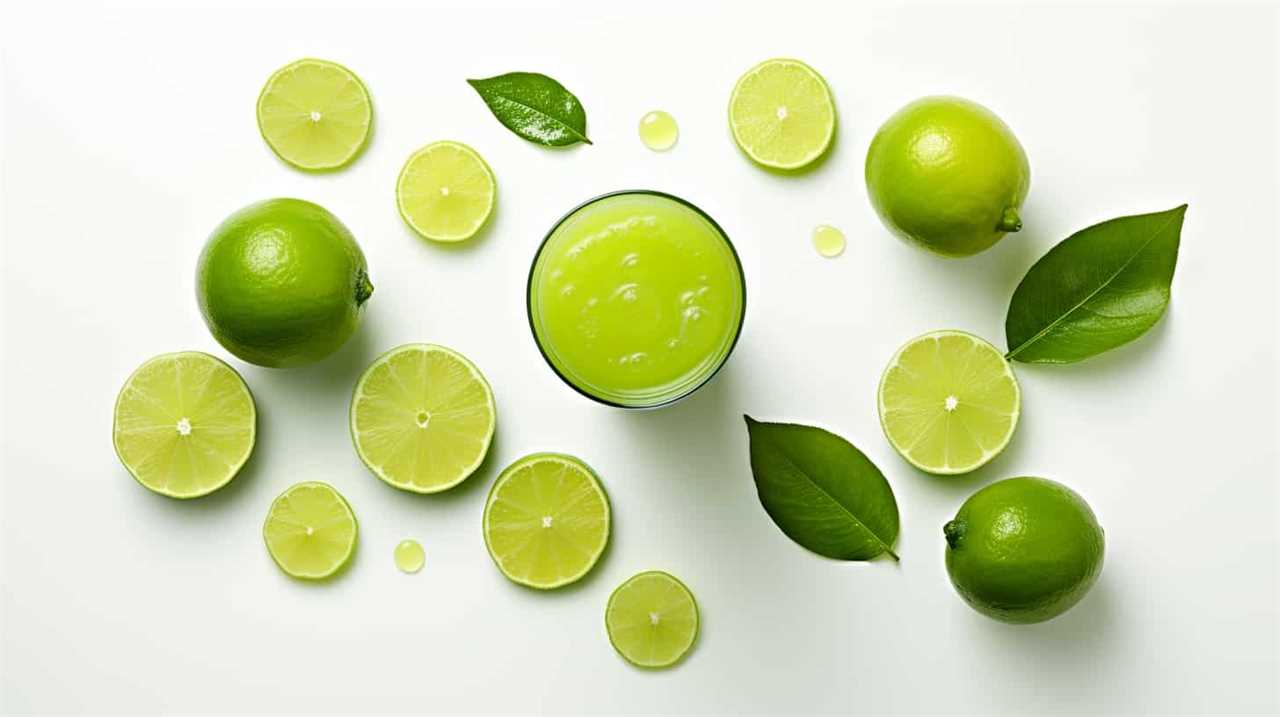
Key Takeaways
- Choose a reputable brand of aloe vera juice that prioritizes quality and uses organic, pure aloe vera.
- Avoid brands that contain added sugars or artificial ingredients.
- Use natural sweeteners like honey, agave syrup, or stevia to enhance the taste of aloe vera juice.
- Experiment with adding fruits, herbs, and other juices to create unique flavor combinations and enhance the health benefits of aloe vera juice.
Choosing the Right Aloe Vera Juice
We can enhance our experience with aloe vera juice by selecting the right brand and type for our preferences. When it comes to finding a reputable brand, it’s important to do some research and read reviews from other consumers. Look for brands that prioritize quality and use organic, pure aloe vera without any added sugars or artificial ingredients. Understanding the health benefits of aloe vera juice is also crucial in making the right choice. Aloe vera is known for its soothing properties, aiding digestion, promoting skin health, and boosting the immune system. By choosing a high-quality brand, we can ensure that we’re getting the maximum benefits from our aloe vera juice.
Now that we know how to choose the right brand, let’s move on to the next step of adding natural sweeteners.
Adding Natural Sweeteners
To enhance the flavor of our aloe vera juice, we can add natural sweeteners such as honey or agave syrup. Using alternative sweeteners not only adds sweetness but also brings unique flavors to the juice. Here are some options to consider:
- Stevia: A natural sweetener derived from the Stevia plant, it’s a zero-calorie alternative to sugar.
- Maple Syrup: This natural sweetener adds a rich and earthy flavor to the aloe vera juice.
- Dates: Pureed dates can be used to sweeten the juice while also providing essential nutrients like fiber.
In addition to using alternative sweeteners, we can enhance the flavor of aloe vera juice by adding spices and extracts. Cinnamon, ginger, or vanilla extract can add warmth and depth to the taste. By experimenting with different combinations of these natural sweeteners, spices, and extracts, we can create a flavor profile that suits our preferences.
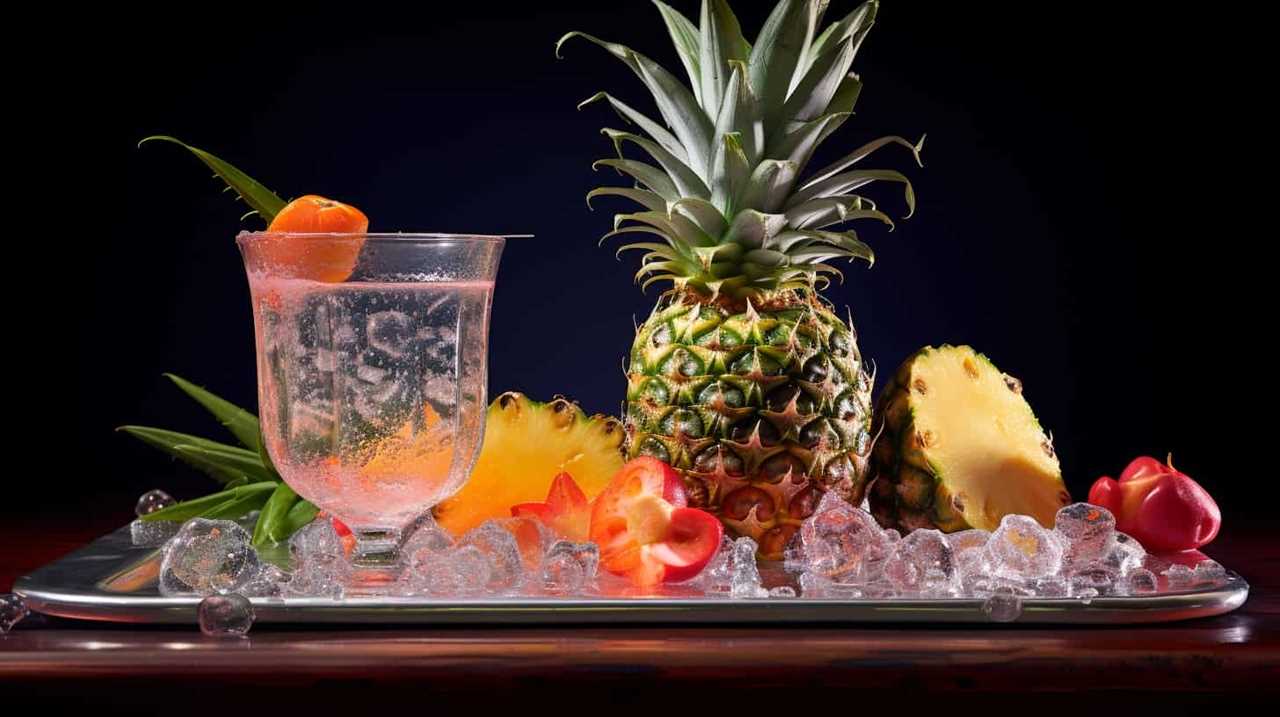
Now, let’s move on to the next section and learn how to infuse aloe vera juice with fruits and herbs to further enhance its taste.
Infusing With Fruits and Herbs
As we explore ways to make our aloe vera juice taste better, one option to consider is infusing it with fruits and herbs. Creating unique aloe vera blends by adding fruits and herbs not only enhances the flavor but also adds a touch of freshness and complexity to the juice. For example, combining aloe vera juice with lemon, mint, or berries can create a refreshing drink that’s both delicious and packed with additional nutrients. It’s similar to the ease of making lemonade with bottled juice—quick, convenient, and customizable to suit your preferences. By experimenting with different fruit and herb combinations, you can elevate your aloe vera juice experience while still reaping its health benefits.
Fruits like strawberries, pineapple, or citrus can add a burst of sweetness, while herbs like mint, basil, or ginger can provide a subtle yet refreshing twist. Exploring the benefits of herbal infusions can also be beneficial for our health. For example, adding a few sprigs of lavender can promote relaxation and reduce stress. Additionally, infusing aloe vera juice with rosemary can aid digestion and boost the immune system.
Blending With Other Juices
Let’s try mixing aloe vera juice with different fruit juices to create delicious and refreshing blends. Blending aloe vera juice with other fruits not only enhances its taste but also adds nutritional benefits to your drink. Here are three fruit juices that you can mix with aloe vera juice:

- Orange juice: Combining aloe vera juice with orange juice not only adds a tangy flavor but also boosts your intake of vitamin C, which is essential for a strong immune system.
- Pineapple juice: Mixing aloe vera juice with pineapple juice creates a tropical blend that isn’t only refreshing but also helps in digestion. Pineapple contains bromelain, an enzyme that aids in breaking down proteins and promoting better digestion.
- Watermelon juice: Blending aloe vera juice with watermelon juice creates a hydrating and refreshing combination. Watermelon is rich in water content and contains electrolytes that can help replenish your body’s fluids.
Experimenting With Flavor Combinations
While we can try various flavor combinations with aloe vera juice, it’s important to find the right balance to enhance its taste. Experimenting with different flavors can’t only make the juice more enjoyable but also enhance its health benefits.
Aloe vera juice is known for its numerous health benefits, such as boosting digestion, promoting hydration, and supporting the immune system. By adding complementary flavors, we can create a refreshing summer drink that not only tastes great but also provides a nutritional boost.
Some popular flavor combinations include mixing aloe vera juice with citrus fruits like lemon or orange, adding a splash of coconut water for a tropical twist, or combining it with cucumber and mint for a refreshing and cooling effect.
Don’t be afraid to get creative and find the flavor combination that suits your taste buds best!
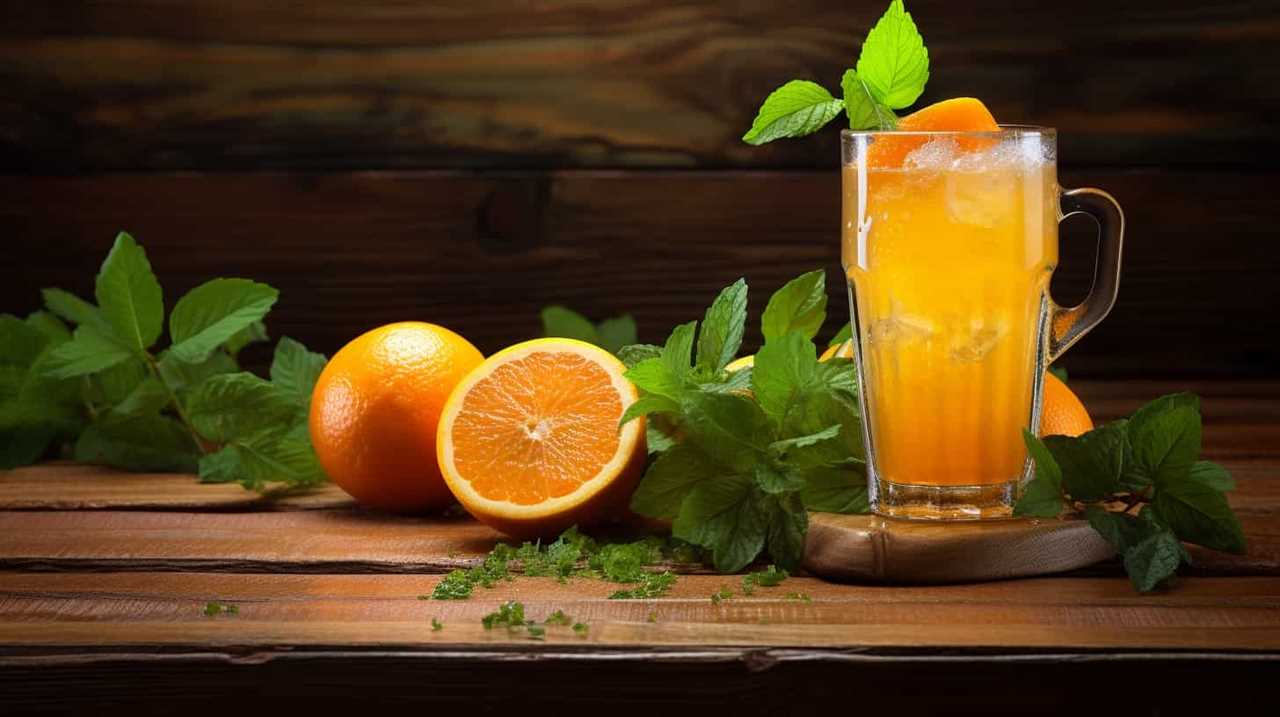
Frequently Asked Questions
Can I Use Store-Bought Aloe Vera Gel Instead of Fresh Aloe Vera for Making Juice?
Yes, you can use store-bought aloe vera gel instead of fresh aloe vera for making juice. However, it’s important to note that fresh aloe vera juice may have more health benefits due to its higher nutrient content.
How Long Can I Store Aloe Vera Juice in the Refrigerator?
Aloe vera juice can be stored in the refrigerator for up to a week. Refrigeration helps maintain the longevity and freshness of the juice, preserving its beneficial properties. It’s important to store the juice in an airtight container to prevent contamination and maintain its quality. Similarly, you might wonder *how long ginger juice lasts*; typically, fresh ginger juice can be refrigerated for about 1–2 weeks as well. Both aloe vera and ginger juices are best consumed within their shelf life to ensure maximum potency and health benefits. Additionally, freezing either juice can extend their shelf life, though some loss of nutrients and potency may occur during the process. When thinking about *how long fresh juice lasts*, it’s crucial to check for signs of spoilage, such as changes in smell, taste, or color, before consuming. To enjoy the best results, it’s always recommended to use fresh ingredients and properly store the juice to ensure you’re getting the most out of its health benefits.
Can Aloe Vera Juice Help With Digestive Issues?
Aloe vera juice can potentially help with digestive issues when taken in appropriate dosages. However, it is important to note that there may be potential side effects. It is always best to consult with a healthcare professional before starting any new supplement regimen.
Can I Use Artificial Sweeteners Instead of Natural Sweeteners in My Aloe Vera Juice?
Using artificial sweeteners in aloe vera juice may affect its taste and potential health benefits. However, natural sweeteners like honey or stevia can enhance the flavor without compromising its nutritional value.

Is It Safe to Drink Aloe Vera Juice Every Day?
Drinking aloe vera juice daily can have numerous benefits, such as improving digestion and boosting the immune system. However, consuming it regularly may also lead to potential side effects like diarrhea or stomach cramps.
Conclusion
In conclusion, making aloe vera juice taste better is easy and enjoyable.
By choosing the right aloe vera juice and adding natural sweeteners, infusing with fruits and herbs, blending with other juices, and experimenting with flavor combinations, you can create a delightful and refreshing drink.
So go ahead and unleash your creativity in the kitchen, and transform your aloe vera juice into a sensational elixir that will transport your taste buds to paradise.
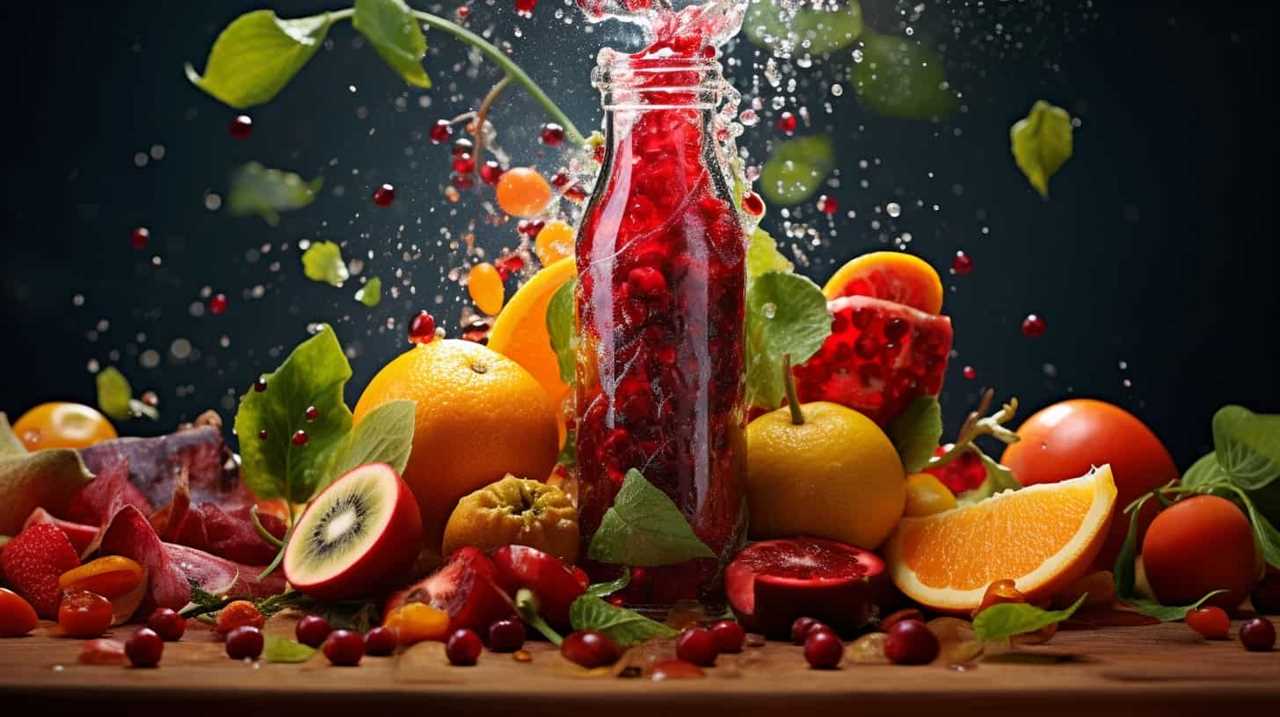
Susannah expertise lies in researching and compiling evidence-based content on juicing, nutrition, and overall health. She is committed to ensuring that The Juicery World offers accurate, up-to-date, and trustworthy information to empower readers to take control of their health. Susannah’s goal is to inspire individuals to embrace juicing as a way to nourish their bodies and live their best lives.
Juice Tips and Tricks
How to Make a Glass of Lemonade With Bottled Lemon Juice

Are you craving a cool glass of lemonade to quench your thirst? Look no further! Try out our perfect recipe using bottled lemon juice that will surely please your taste buds.
In this article, we’ll guide you through the process of creating a tangy and sweet concoction that will leave you feeling refreshed and satisfied.
So grab your ingredients and let’s get started on this delightful journey of serving ourselves and others a glass of pure lemony goodness.
Key Takeaways
- Consider the storage of the bottled lemon juice (dark glass or plastic bottles, protect from light exposure, check expiration date)
- Choose a suitable pitcher and fresh lemons for enhanced flavor
- Store the lemonade concentrate in the refrigerator to maintain freshness
- Adjust the sweetness and tartness to taste with sugar or more lemon juice, and experiment with different sweeteners or additional flavors.
Choosing the Right Bottled Lemon Juice
What are the key factors we should consider when selecting the right bottled lemon juice for our lemonade?

One important factor is how the lemon juice is stored. Look for bottles that are made of dark glass or plastic, as they help protect the juice from light exposure, which can degrade its quality. It’s also important to check the expiration date to ensure freshness.
Another benefit of using bottled lemon juice is convenience. It saves time and effort compared to squeezing fresh lemons. Additionally, bottled lemon juice provides consistent flavor, as the acidity levels are standardized.
When selecting a brand, consider reading reviews and checking for certifications, such as organic or non-GMO.
Gathering the Necessary Ingredients and Tools
How can we gather all the necessary ingredients and tools to make a glass of lemonade with bottled lemon juice? First, we’ll need to collect bottled lemon juice, sugar, and cold water, as well as a pitcher and a spoon for mixing. If you prefer extra flavor, you can also gather ice and optional add-ins like mint or soda water. While preparing the lemonade, it’s easy to understand why some people wonder about other citrus drinks and may ask, “how many oranges per gallon” are needed when making orange juice instead. Once everything is assembled, combine the lemon juice, sugar, and water in the pitcher, stirring until the sugar dissolves. Feel free to adjust the sweetness or tartness to your liking, and don’t forget to add ice or any optional add-ins for an extra refreshing touch. This process might even make you curious about how much juice from oranges is needed when making fresh orange juice compared to using bottled citrus products. Once your lemonade is ready, pour it into a glass and enjoy the refreshing taste. This simple recipe can inspire you to try other homemade juices, such as learning **how to make pear juice** or experimenting with other fruit combinations. Whether you’re using fresh fruits or bottled options, creating your own beverages is a fun and rewarding way to personalize your drinks.
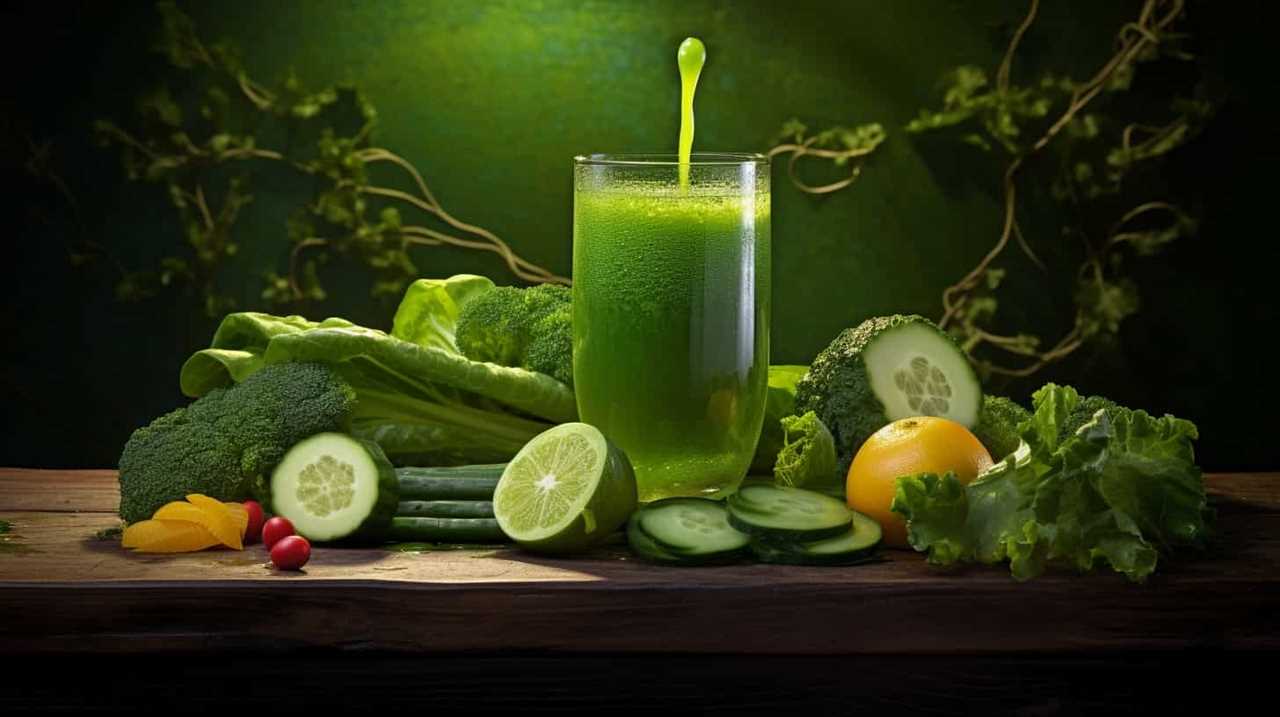
It’s important to start with the right pitcher. Look for a pitcher that’s made of glass or BPA-free plastic, as these materials won’t affect the taste of the lemonade. The pitcher should also have a lid or cover to keep the lemonade fresh and prevent spills.
Now, let’s talk about the lemons. While bottled lemon juice is convenient, using fresh lemons instead can elevate the flavor of your lemonade. Choose lemons that are firm and have a bright yellow color. Give them a gentle squeeze to ensure they’re juicy. To extract the juice, you’ll need a citrus juicer or a reamer. These tools make it easy to get every last drop of juice from the lemons.
Mixing the Lemonade Concentrate
To start mixing the lemonade concentrate, we’ll slowly pour the bottled lemon juice into the pitcher. It’s important to choose the right container for the lemonade concentrate. A pitcher with a lid or a tightly sealed container will help maintain the freshness and prevent any spills or leaks. Once the lemon juice is in the pitcher, we can move on to the next step of adding water and sweetener.
To ensure the lemonade concentrate stays fresh, it’s essential to store it properly. Keep the pitcher in the refrigerator to maintain its cool temperature and prevent any bacteria growth. If you have any leftover concentrate, transfer it to a smaller container with an airtight lid before refrigerating. This will help retain its flavor and prevent any contamination.

Now that we’ve mixed the lemonade concentrate, it’s time to adjust the sweetness and tartness to taste.
Adjusting the Sweetness and Tartness to Taste
We can adjust the sweetness and tartness of the lemonade to taste by adding more sugar or lemon juice, respectively. If you prefer a sweeter lemonade, simply add more sugar and stir until it dissolves completely. You can experiment with different sweeteners such as honey or agave syrup to find the perfect balance of sweetness.
On the other hand, if you want a tangier lemonade, add more lemon juice gradually, tasting as you go until it reaches your desired level of tartness.
Additionally, you can get creative with your lemonade by adding flavors like fresh mint leaves or a hint of lavender. These additions can elevate the flavor profile and create a more refreshing and unique experience.

Now that we’ve adjusted the sweetness and tartness of our lemonade, let’s move on to serving and enjoying your refreshing glass of lemonade.
Serving and Enjoying Your Refreshing Glass of Lemonade
Now let’s sit back, relax, and savor our refreshing glass of lemonade.
When it comes to serving and enjoying this delightful drink, there are a few techniques and garnishing options to consider.
Firstly, serving your lemonade chilled is essential for maximum enjoyment. Ensure that you have chilled glasses or add ice cubes to the glasses before pouring the lemonade.

To add a touch of elegance, you can garnish your lemonade with a slice of lemon on the rim of the glass. For an extra burst of flavor, you could also add a sprig of fresh mint or a few berries.
Remember to gently stir the lemonade before serving to evenly distribute the flavors.
Now, take a sip, feel the refreshing tang of lemon, and let the sweet and tart flavors dance on your taste buds.
Cheers!
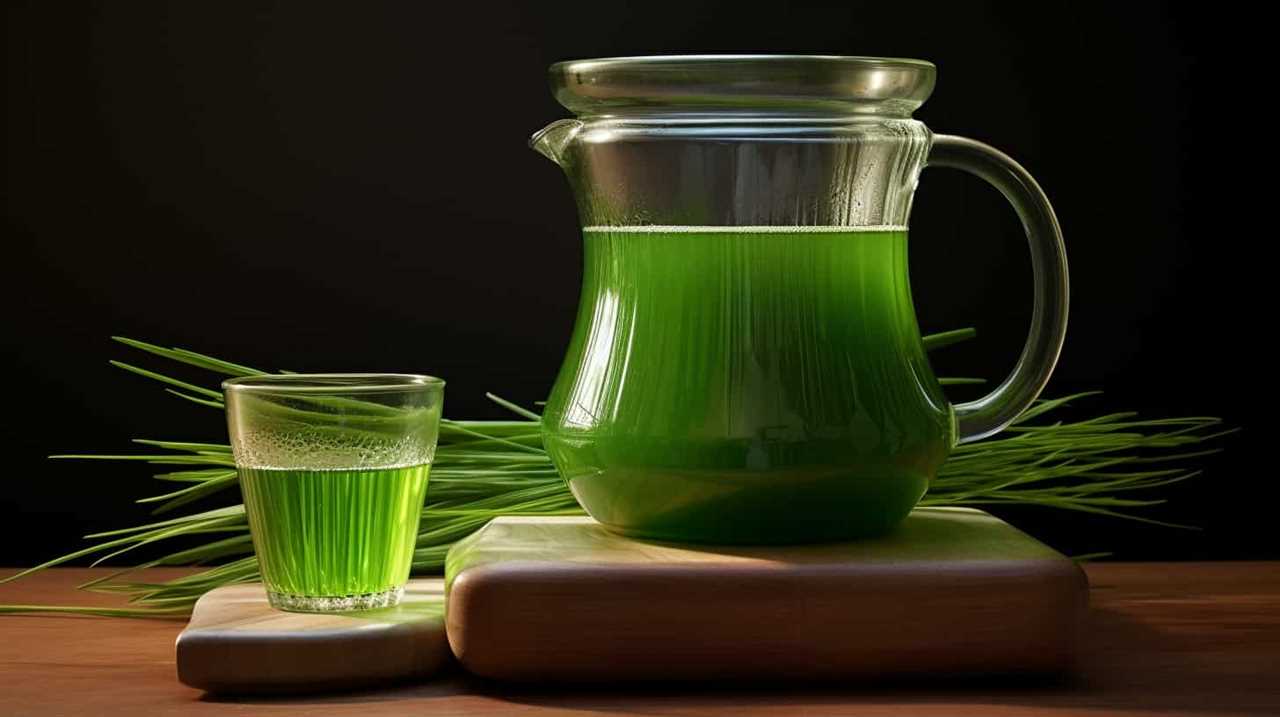
Frequently Asked Questions
Can I Use Fresh Lemons Instead of Bottled Lemon Juice?
Fresh lemons offer numerous benefits over bottled lemon juice. The taste of fresh lemons is unparalleled, providing a vibrant and tangy flavor. Incorporating fresh lemons into your lemonade will elevate its taste and give it a refreshing and authentic twist.
Can I Substitute Sugar With a Different Sweetener?
Substituting sweeteners in lemonade can enhance the flavor and offer health benefits. We’re knowledgeable about alternative sweeteners and can provide precise, detailed instructions on using them in place of sugar.
How Long Does the Lemonade Concentrate Need to Chill in the Refrigerator?
The chilling time for the lemonade concentrate in the refrigerator is typically around 1-2 hours. Using bottled lemon juice offers the benefit of convenience and consistent flavor for a refreshing glass of lemonade.
Can I Add Other Fruits or Flavors to the Lemonade?
Sure, we can definitely add different fruits or flavors to our lemonade. It’s a great way to experiment with unique flavors and create refreshing, personalized drinks. The possibilities are endless!

How Long Does the Lemonade Stay Fresh in the Refrigerator?
Lemonade made with bottled lemon juice can stay fresh in the refrigerator for about 5-7 days. To maximize shelf life, store it in an airtight container and keep it chilled.
Conclusion
And so, with a few simple steps and the right ingredients, a glass of refreshing lemonade is born.
Like a symphony of flavors dancing on your taste buds, this tangy elixir quenches thirst and brings joy on a hot summer day.
Just a sip transports you to a world of citrusy delight, where the sweetness and tartness blend harmoniously.

So go ahead, indulge in the art of lemonade-making and savor every drop of this sun-kissed nectar.
Cheers to the perfect glass of lemonade!
Susannah expertise lies in researching and compiling evidence-based content on juicing, nutrition, and overall health. She is committed to ensuring that The Juicery World offers accurate, up-to-date, and trustworthy information to empower readers to take control of their health. Susannah’s goal is to inspire individuals to embrace juicing as a way to nourish their bodies and live their best lives.
Juice Tips and Tricks
How to Know if Orange Juice Is Bad

We’ve all been in that situation before – reaching for a glass of orange juice and hesitating, unsure if it’s still okay to drink. Fear not! This article will give you the knowledge you need to determine for sure if your orange juice is still fresh or if it’s gone bad.
With a blend of scientific precision and practical tips, we’ll explore color changes, strange smells, off taste, texture changes, and mold or growth that may indicate spoilage.
Let’s dive in and serve ourselves a refreshing glass of certainty!
Key Takeaways
- Color changes in orange juice can indicate a loss of freshness and shelf life extension, but it doesn’t necessarily mean the juice is bad.
- Unusual or off-putting odors in orange juice, such as sour or fermented scents, can be a sign of poor quality.
- An off taste in orange juice, such as sour, bitter, or fermented flavors, suggests that the juice is spoiled.
- Texture changes in orange juice, such as pulp separation or a thicker consistency, can occur as the juice ages, so it’s important to consume it before the expiration date.
Color Changes in Orange Juice
We should be aware that color changes can indicate whether orange juice is bad.

When it comes to orange juice, color is a crucial factor to consider. As oranges are exposed to air, an oxidation process occurs, which leads to changes in color. Fresh orange juice has a vibrant orange hue, indicating its freshness and high nutritional value.
However, as time passes, the juice may undergo a color change, turning dull or brownish. This change in color is a result of the oxidation process, which affects the flavor and quality of the juice. It’s important to note that while a change in color doesn’t necessarily mean the juice is bad, it does indicate that the juice is losing its freshness and shelf life extension.
Therefore, it’s advisable to consume orange juice when it’s at its freshest, as indicated by its vibrant orange color.
Strange Smells in Orange Juice
When it comes to evaluating orange juice, we should be cautious of any strange smells or odors. A fresh, pleasant smell is indicative of good quality orange juice. However, if you notice any unusual or off-putting odors, it may be a sign that the juice has gone bad. These smells can range from a sour or fermented scent to a rancid or moldy aroma.

It’s important to note that while some natural variations in scent can occur due to the specific variety of oranges used, any strong or unpleasant smells should raise concerns. If you have citrus fruit allergies, it’s especially important to pay attention to the smell of orange juice, as it could indicate the presence of spoilage or contamination.
Ensuring the quality of orange juice is essential as it’s a popular beverage known for its health benefits, including being rich in vitamin C and antioxidants.
Off Taste of Orange Juice
Our taste buds can detect even the slightest hint of an off taste in orange juice, which can indicate that it has gone bad. The taste of orange juice should be fresh, tangy, and slightly sweet. If it tastes sour, bitter, or fermented, it’s likely spoiled.
One common cause of an off taste in orange juice is the use of overripe oranges. When oranges become overripe, their flavor profile changes, resulting in a less pleasant taste. Another factor to consider is the expiration date. Orange juice that has passed its expiration date is more likely to develop an off taste. It’s important to check the expiration date before consuming orange juice to ensure its freshness and quality. Additionally, improper storage conditions, such as leaving the juice at room temperature for extended periods, can lead to the development of unpleasant flavors. Storing orange juice in the refrigerator helps maintain its freshness for longer. For those exploring different juice options, aloe vera juice flavor tips suggest pairing tart juices with milder flavors to balance the overall taste.
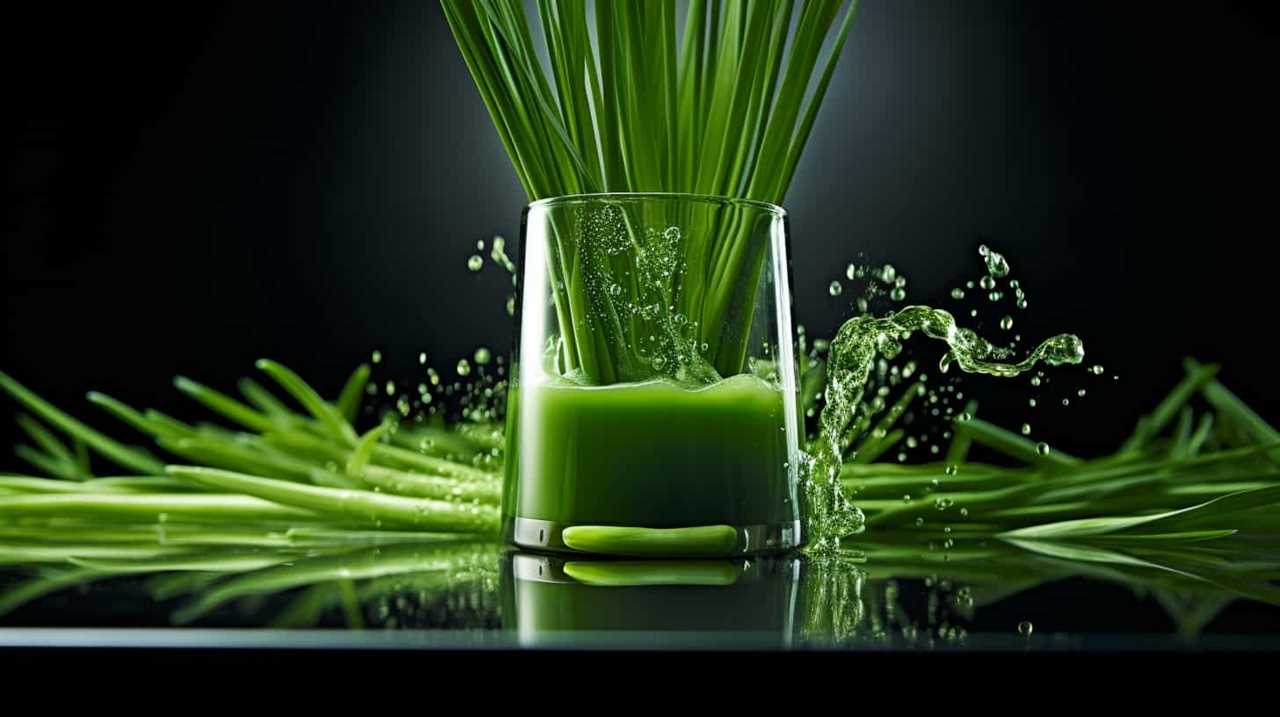
Now, let’s move on to discuss the texture changes in orange juice.
Texture Changes in Orange Juice
As we explore the texture changes in orange juice, it’s important to note that certain factors can cause it to become thicker or develop sediment. One common texture change in orange juice is pulp separation, where the pulp separates from the liquid and settles at the bottom. This can occur naturally over time, as the pulp particles become denser and sink.
Another factor that can affect the texture of orange juice is the expiration date. As orange juice ages, it may start to develop a thicker consistency and even form sediment. This is a result of the natural breakdown of the juice’s components. Therefore, it’s crucial to check the expiration date on orange juice and consume it before it reaches its expiration date to avoid any undesirable texture changes.
Mold or Growth in Orange Juice
We need to be aware of the possibility of mold or other growth occurring in orange juice. Mold can develop in orange juice if it isn’t stored properly or if it has passed its expiration date.
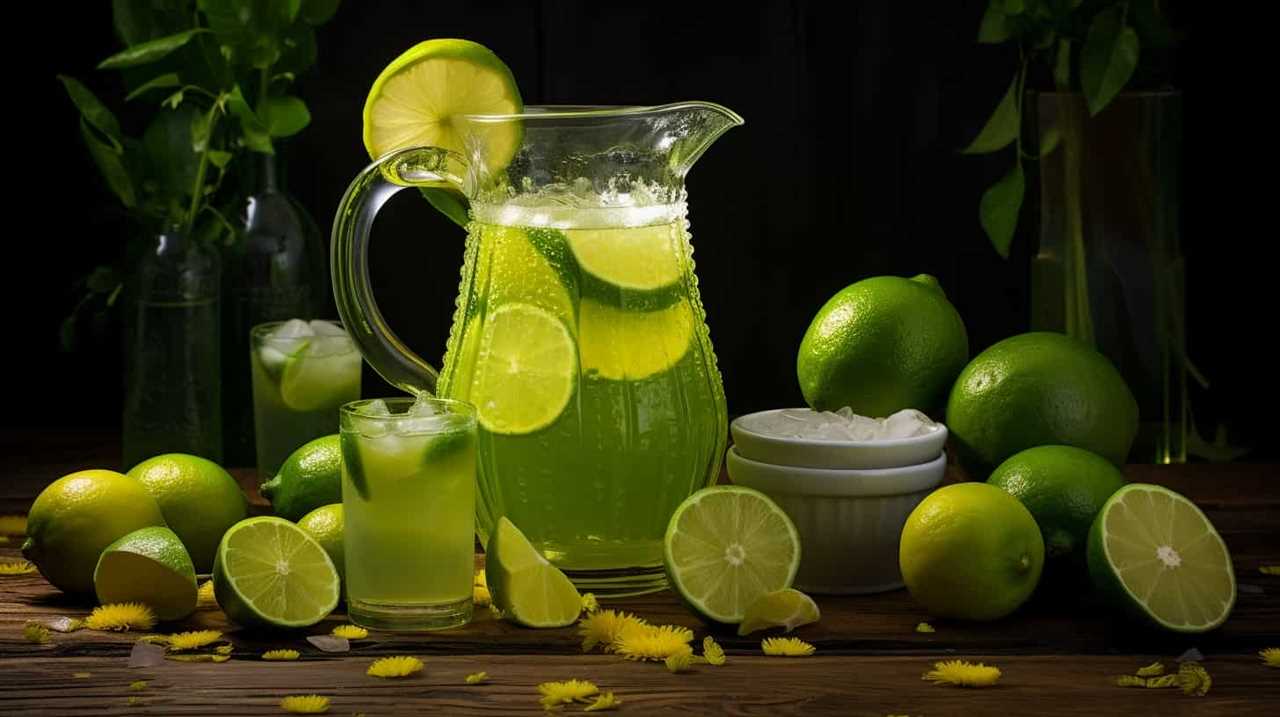
To prevent mold growth, it’s important to follow these steps:
- Store orange juice in the refrigerator at a temperature below 40°F (4°C).
- Check the expiration date on the bottle before consuming. Discard any orange juice that has expired.
- Keep the container tightly sealed to prevent air and moisture from entering, as these can promote mold growth.
Regularly inspecting orange juice for any signs of mold or unusual growth is essential. If you notice any discoloration, a strange odor, or visible mold, it’s best to discard the juice to avoid any potential health risks.
Frequently Asked Questions
Can Orange Juice Go Bad if It’s Stored in the Freezer for Too Long?
Frozen orange juice can potentially lose its nutrients and change its taste if stored in the freezer for too long. It is important to check for signs of spoilage before consuming it.
How Long Can Orange Juice Stay Fresh in the Refrigerator Once It’s Opened?
Once opened, orange juice can stay fresh in the refrigerator for about 7-10 days. To maintain its freshness, store it properly by keeping it tightly sealed and at a consistently cold temperature. If the orange juice develops an off odor, flavor, or appearance, it’s best to discard it to avoid any potential health risks. Factors like exposure to air and varying temperatures can influence how long orange juice lasts, so it’s crucial to handle it with care. Always check the expiration date as a general guide, but remember that proper storage can extend its freshness slightly. Additionally, avoid leaving the orange juice out at room temperature for extended periods, as this can significantly shorten how long orange juice lasts. Freezing the juice can be another option to extend its shelf life, but be aware that this may alter its texture and taste once thawed. By following these precautions, you can ensure your orange juice stays fresh and safe to consume.
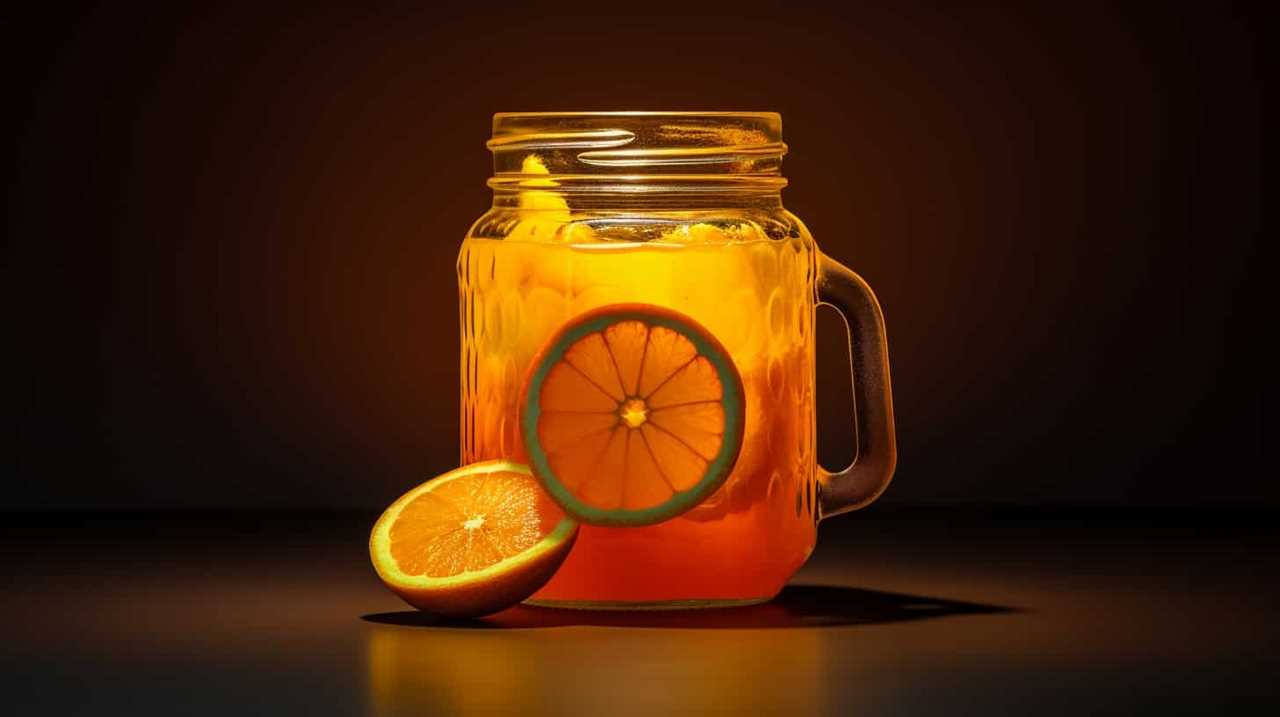
Is It Safe to Consume Orange Juice That Has Been Left Out at Room Temperature Overnight?
Left out orange juice may not be safe to drink as it can harbor harmful bacteria. Signs of spoiled orange juice include a sour smell, mold growth, and a change in color or taste.
Can Orange Juice Develop Harmful Bacteria if It’s Past Its Expiration Date but Still Looks and Smells Fine?
Orange juice can cause food poisoning if it develops harmful bacteria, even if it looks and smells fine. Signs of spoiled orange juice include a sour smell, mold growth, and a change in color or taste.
Does the Nutritional Value of Orange Juice Decrease as It Starts to Go Bad?
As orange juice goes bad, its nutritional value decreases. The longer it sits on the shelf, the more nutrients it loses. Signs of spoilage include a sour smell, off taste, and mold growth.
Conclusion
In conclusion, determining if orange juice is bad requires careful observation of color changes, strange smells, off taste, and texture changes. Just like a detective investigating a case, we must rely on our senses to detect any signs of spoilage.
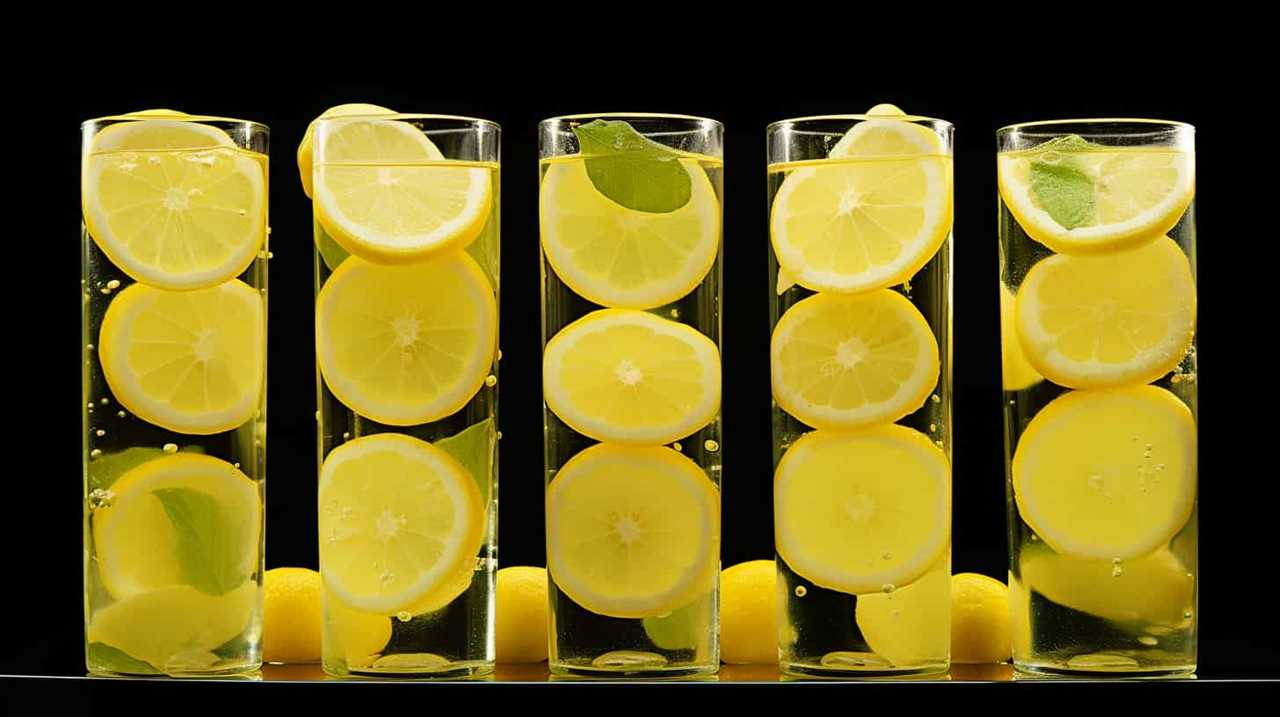
If we detect mold or growth in the orange juice, it’s a clear indication that it’s no longer safe to consume. By remaining vigilant and attuned to these indicators, we can ensure that our orange juice is always fresh and enjoyable.
Susannah expertise lies in researching and compiling evidence-based content on juicing, nutrition, and overall health. She is committed to ensuring that The Juicery World offers accurate, up-to-date, and trustworthy information to empower readers to take control of their health. Susannah’s goal is to inspire individuals to embrace juicing as a way to nourish their bodies and live their best lives.
-

 Vetted2 months ago
Vetted2 months ago15 Best Juices for Diabetics: Refreshing Options That Won’t Spike Your Blood Sugar
-

 Vetted2 months ago
Vetted2 months ago15 Best Decaf Coffee Options for Flavor Lovers Who Need a Caffeine Break
-

 Vetted2 months ago
Vetted2 months ago15 Best Espresso Ground Coffees to Elevate Your Morning Brew
-

 Vetted2 months ago
Vetted2 months ago15 Best K-Cup Coffee Pods for a Perfect Brew Every Time
-

 Vetted2 months ago
Vetted2 months ago15 Best Beans for Espresso: A Guide to Perfecting Your Brew
-

 Vetted2 months ago
Vetted2 months ago15 Best Inexpensive Espresso Machines That Brew Quality Coffee on a Budget
-

 Vetted2 months ago
Vetted2 months ago15 Best Kona Coffees to Savor the Rich Flavors of Hawaii
-

 Vetted2 months ago
Vetted2 months ago15 Best Cold Brew Coffees to Keep You Refreshed All Summer Long








